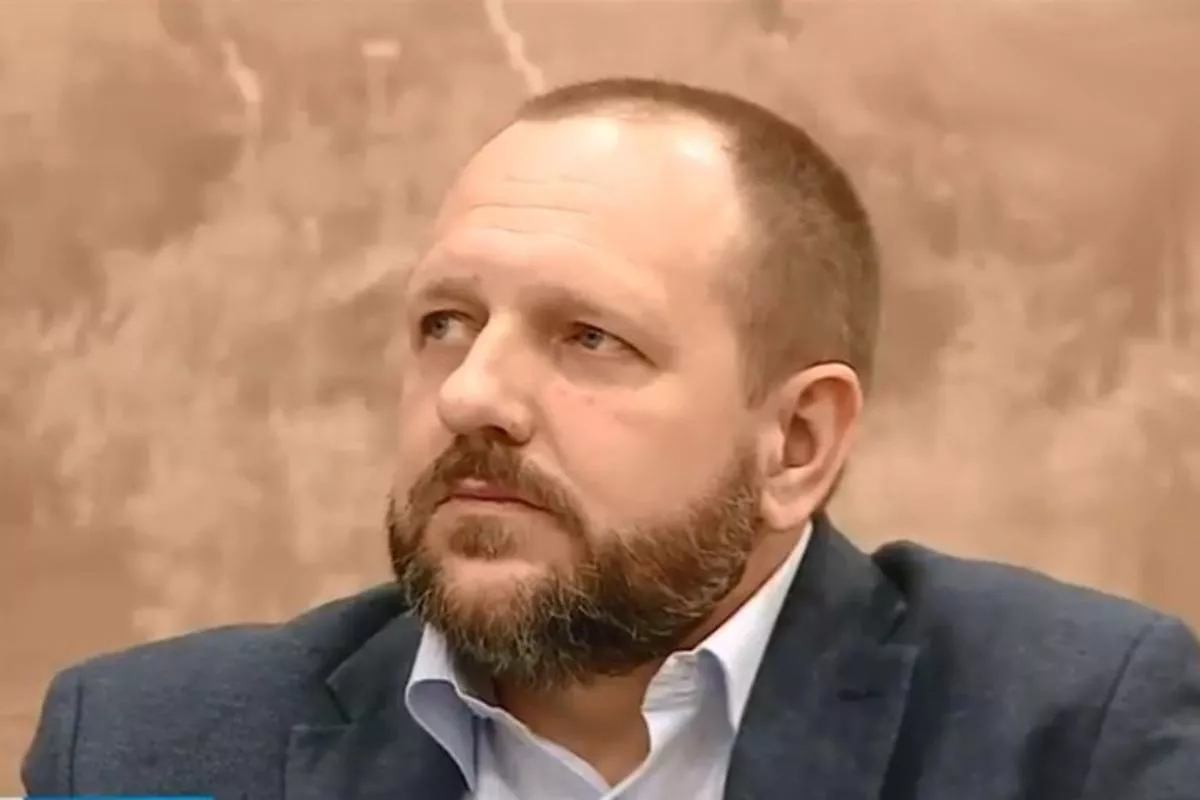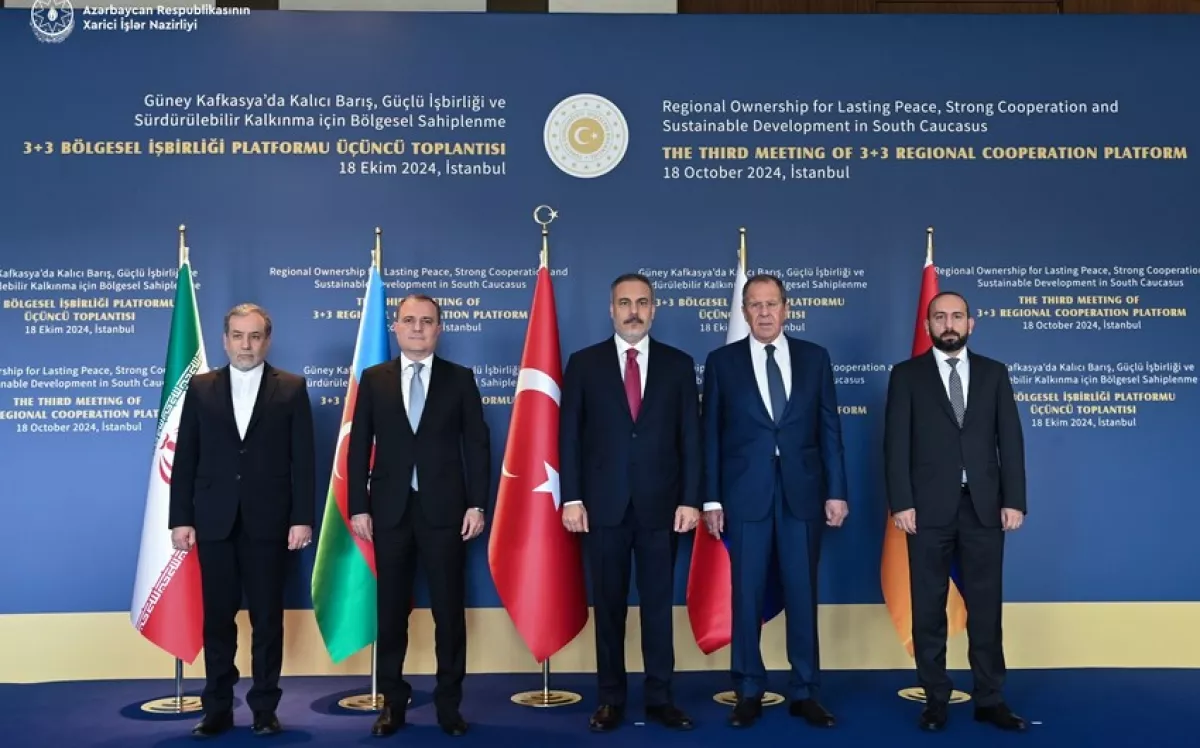Will the 3+3 format forge lasting peace in the South Caucasus? Expert insights
The third meeting of the Consultative Regional Platform 3+3 took place in Istanbul. Turkish Foreign Minister Hakan Fidan opened the meeting, which included the participation of Azerbaijan's Foreign Minister Jeyhun Bayramov, Armenia's Foreign Minister Ararat Mirzoyan, Iran's Foreign Minister Abbas Araghchi, and Russia's Foreign Minister Sergey Lavrov. Fidan welcomed the delegations from Azerbaijan, Armenia, Iran, and Russia, noting that this event serves as a consultative platform aimed at ensuring lasting peace in the South Caucasus and assessing opportunities for cooperation.
Meanwhile, the Foreign Minister expressed regret over the absence of the Georgian delegation, another participant in the 3+3 platform.
"Although the platform is called 3+3, unfortunately, one country is not participating in the meeting. I want to emphasize once again that this platform is always open to our close neighbour and friend—Georgia, which can join at any time," he noted.
The regional cooperation platform was established at the initiative of Turkish President Recep Tayyip Erdoğan and Azerbaijani President Ilham Aliyev shortly after the end of the Second Karabakh War, in December 2020.
What does the future hold for this format? Will 3+3 evolve into a comprehensive cooperation platform? Currently, it operates as 3+2, raising questions about the conditions under which Georgia could join. Are there any prospects for this?
Foreign political commentators answered these questions for Caliber.Az.

Russian political scientist and founder of the expert-analytical network PolitRUS, Vitaly Arkov, emphasizes that the Istanbul meeting of foreign ministers underscored the significance and potential of this initiative.
"It provides a platform to discuss pressing regional issues and find compromise solutions without the interference of external actors, whose actions often tend to be destructive and even aimed at inciting military conflicts. This is evident in the policies of France under Emmanuel Macron and the United States under Joe Biden regarding the South Caucasus," the analyst states.
He acknowledges, however, that there are notable contradictions within the format itself.
"Georgia still does not participate in this initiative. Nevertheless, the emerging trend of 'warming' relations between Tbilisi and Moscow offers hope that, in the medium term, the current effective format of 3+2 will ultimately evolve into a fully functional 3+3.
However, there are also contradictions among the participants in the South Caucasus Regional Cooperation Platform. The unresolved Armenian-Azerbaijani conflict immediately comes to mind, as it remains unsettled until a peace treaty is signed and border issues are resolved. Yet, a less overt but equally significant confrontation exists between Iran and Türkiye, driven by Tehran's serious concerns over Ankara's growing influence both within the region and beyond. Consequently, Iran is actively seeking to obstruct this process wherever possible, creating difficulties for Türkiye.
One example is the Zangezur (Syunik or Meghri) corridor. Tehran is making extensive efforts to prevent its restoration. While these efforts were previously conducted behind the scenes, Iran has now moved to openly assert its interests in a rather forceful manner," Arkov noted.

Doctor of Political Science and Georgian expert on international relations Irakli Gogava believes that any format for regional dialogue is beneficial and productive.
"Dialogue is always better than its absence. The South Caucasus is currently at a crossroads: which path should it take moving forward? In the context of global processes, this choice is even more pressing. We see that the Potsdam peace is shattered, and there are no new rules in place. The international system, in the absence of rules, is a dangerous place, especially for small countries. Thus, it is imperative that the countries of the South Caucasus first come to an agreement among themselves regarding the common future of the region. They need to establish the fundamental principles for regional development, naturally considering the legitimate interests of neighbouring countries, adjacent regions, and global players. Such an approach would strengthen the 3+3 format.
The resolution of the Karabakh issue creates a real basis for dialogue between Azerbaijan, Armenia, and Georgia in a trilateral format. The Georgian authorities are currently refraining from participating in 3+3, as they believe that all participant countries should respect each other's territorial integrity. However, I believe this issue will soon shift from its current stalemate.
Russia's current position is that the recognition of Abkhazia and the Tskhinvali region will not be revoked, but Russia is willing to accept any agreement between the Abkhaz and Georgians, as well as between the Ossetians and Georgians. Furthermore, the latest statement from Minister Lavrov indicates that Russia intends to facilitate the initiation of such dialogue. When this process begins—likely at the start of 2025—the results will positively reflect on the entire region and its neighbours.
As conflicts are resolved and reconciliation takes place, all communications in the region will open up for the countries in the 3+3 format and beyond. We see that China and India have already begun developing mega-trade corridors that will cross through our countries. This is a global process, and it presents opportunities for all of us that have not existed for the last 500 years, at least since the 17th century, when the Great Silk Road declined and the axis of global trade shifted to oceanic trade routes. Now, we are witnessing a reverse process," the expert stated.
He believes that the 3+3 format has prospects, particularly in preserving peace and stability in our region.
"Given that the sizes of the countries are incomparable, I do not see the potential for comprehensive economic integration, but targeted cooperation on specific issues is quite feasible, and we should move in that direction. Steps toward moderate economic integration and the establishment of a single market, along with an intelligent division of labour and guaranteed market segments for each other, are entirely possible for Azerbaijan, Armenia, and Georgia. The synergistic effect would be overwhelming, and discussions could be held with larger neighbouring countries regarding special trade regimes based on principles of fair trade and, importantly, fair competition. In any case, the 3+3 format is a very practical platform, and it is necessary," Gogava added.

According to him, the essential conditions for the deployment of full-scale cooperation are peace treaties, the resolution of all conflicts, the unblocking of all communications, respect for the internationally recognized state borders and sovereignty of countries, as well as addressing the aftermath of conflicts, such as the return of refugees, the reconstruction of conflict zones, and related humanitarian and legal issues.
"In the end, if the countries of the South Caucasus work together, it will not be beneficial for anyone to rock the boat; rather, the more vigorously we row, the better it will be for everyone, and the faster we will see positive results. I believe that starting next year, when a real dialogue begins between Georgians and Abkhaz, as well as with Ossetians, Georgia's participation in the 3+3 format will soon follow. Analyzing the current global and regional situation, I think that resolving all conflicts in the South Caucasus is on the horizon, as the interests of major powers—China, India, Europe, and others—are already at stake. For Russia, access to the south is becoming an existential necessity, especially considering the iron curtain that the elite of Western Europe is lowering again on the geopolitical stage before Russia, reminiscent of Churchill's speech in Fulton," Gogava concluded.








